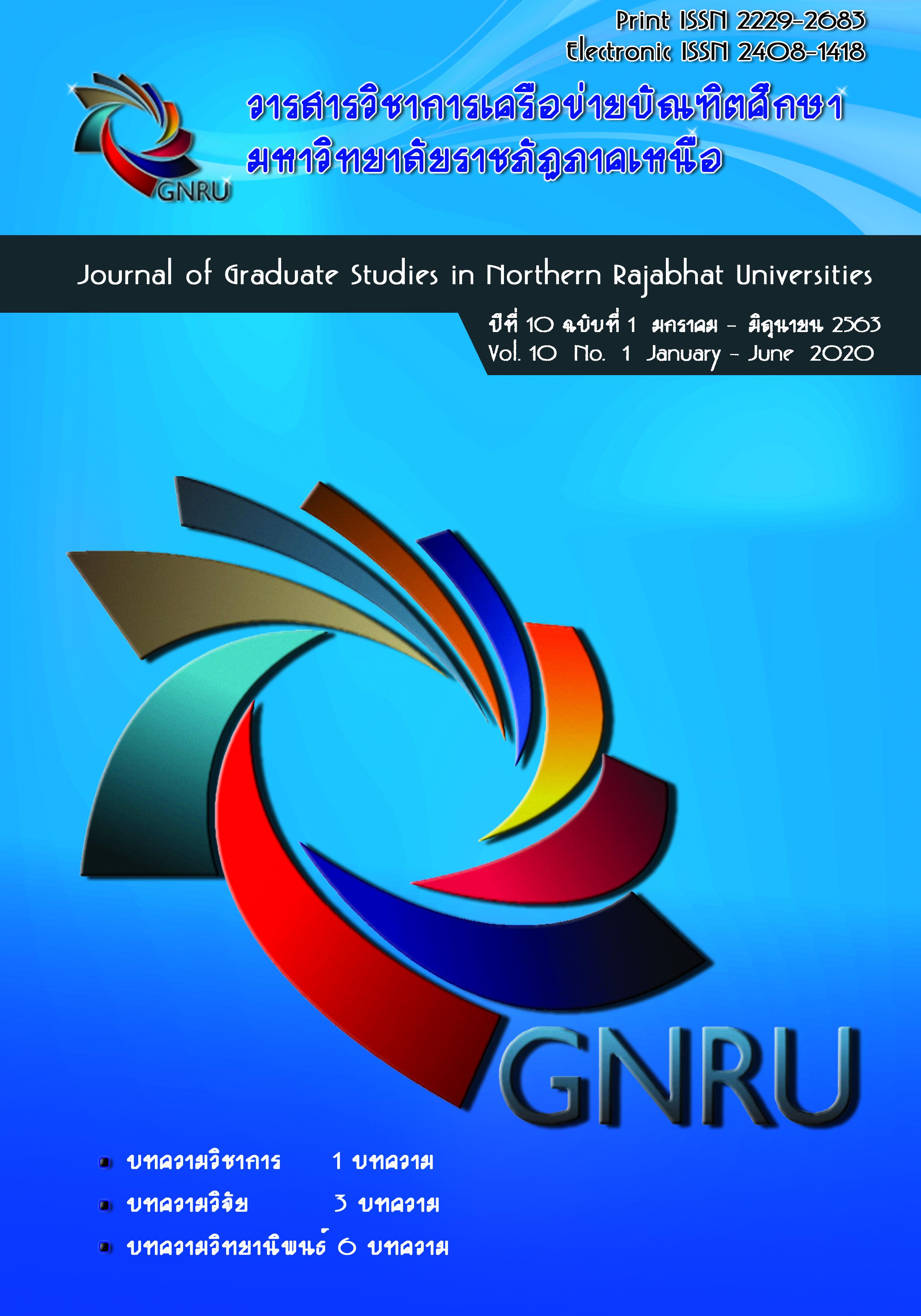ความสัมพันธ์ระหว่างโอกาสในการล้มละลาย ธุรกิจครอบครัวและการตกแต่งกำไรของบริษัทจดทะเบียนในตลาดหลักทรัพย์แห่งประเทศไทย The Relationship among Bankruptcy Risk Level, Family Firm, and Earnings Management of Thai Listed Companies
Main Article Content
Abstract
งานวิจัยนี้มีวัตถุประสงค์เพื่อศึกษาความสัมพันธ์ระหว่างโอกาสในการล้มละลาย ธุรกิจครอบครัวและการตกแต่งกำไร เก็บข้อมูลจากงบการเงินของบริษัทจดทะเบียนในตลาดหลักทรัพย์แห่งประเทศไทย ตั้งแต่ ปี 2557 – 2559 จำนวนทั้งสิ้น 1,119 ตัวอย่าง สถิติที่ใช้ในการวิเคราะห์ข้อมูลได้แก่ ค่าเฉลี่ย ส่วนเบี่ยงเบนมาตรฐาน ค่าต่ำสุด ค่าสูงสุด การวิเคราะห์สหสัมพันธ์พหูคูณ และการวิเคราะห์การถดถอยหพูคูณ
ผลการวิจัยพบว่า โอกาสในการล้มละลาย และขนาดของกิจการมีความสัมพันธ์ทางบวกต่อการตกแต่งกำไรของบริษัทจดทะเบียนในตลาดหลักทรัพย์แห่งประเทศไทยอย่างมีนัยสำคัญทางสถิติ อย่างไรก็ตามธุรกิจครอบครัวไม่มีความสัมพันธ์กับการตกแต่งกำไร ดังนั้นหน่วยงานที่เกี่ยวข้องอาจนำผลการวิจัยไปกำหนดนโยบายเพื่อยับยั้งพฤติกรรมการตกแต่งกำไรที่อาจส่งผลเสียต่อความน่าเชื่อถือของข้อมูลในตลาดหลักทรัพย์แห่งประเทศไทยต่อไป
The objective of this research was to study the relationship between bankruptcy risk level, family firm and earnings management of Thai Listed Companies. Data were collected from the financial statements of companies listed on the Stock Exchange of Thailand from year 2014 - 2016 in a total of 1,119 samples. The statistics used in data analysis were mean, standard deviation, minimum value, maximum value, correlation analysis, and multiple regression analysis.
The result of the research showed that chance of bankruptcy risk level, and the size of the business has a positive relationship to the earnings management of the companies listed on the Stock Exchange of Thailand with statistical significance. However, the family business has no relationship with earnings management. Therefore, relevant agencies may use research results to formulate policies to restrain earnings management behavior that may negatively affect the credibility of the information on the Stock Exchange of Thailand.
Article Details
References
กฤษณา กัมปนาทโกศล และ ชาญชัย ตั้งเรือนรัตน์. (2551). การตกแต่งกำไรกับสัดส่วนการก่อหนี้. วารสารวิชาชีพบัญชี, 4 (10) : pp. 66-78.
ณัฎฐยา เพชรล่อเหลียน. (2553). การศึกษาความสัมพันธ์ระหว่างโอกาสในการล้มละลายและการ ล้มละลายของบริษัทจดทะเบียนในตลาดหลักทรัพย์แห่งประเทศไทย. การศึกษาอิสระปริญญาโท บัญชีมหาบัณฑิต. มหาวิทยาลัยธรรมศาสตร์, กรุงเทพฯ.
ประเสริฐ ลีฬหาวาสน์ และ มนวิกา ผดุงสิทธิ์. (2552). การพยากรณ์ภาวะล้มเหลวทางธุรกิจจาก ข้อมูลทางบัญชี. วารสารวิชาชีพบัญชี, 5 (13) : pp. 65-82.
พิมพรรณ สืบศรี. (2560).ระดับภาวะความเครียดทางการเงินและการตกแต่งกำไร ผ่านรายการคงค้างภายใต้ดุลยพินิจของผู้บริหาร. (การศึกษาอิสระปริญญาโท บัญชีมหาบัณฑิต). มหาวิทยาลัยธรรมศาตร์, กรุงเทพฯ.
พรทิวา ขาวสะอาด. (2555). ปัจจัยที่มีความสัมพันธ์กับระดับการจัดการกำไร : กรณีศึกษาบริษัทจดทะเบียนในตลาดหลักทรัพ์แห่งประเทศไทย. วารสารวิชาการศรีปทุม ชลบุรี , 9 (2) : pp. 29-34.
ลลิตา แซ่กัง. (2558). ความสัมพันธ์ระหว่างความเป็นครอบครัวต่อผลการดำเนินงานของธุรกิจ กรณีศึกษาบริษัทจดทะเบียนในตลาดหลักทรัพย์แห่งประเทศไทย ในกลุ่ม SET 100. (การศึกษาอิสระปริญญาโท วิทยาศาสตรมหาบัณฑิต สาขาวิชาการบริหารการเงิน).มหาวิทยาลัยธรรมศาสตร์, กรุงเทพฯ.
วศิดา รัตนวิจิตร. (2556). ความสัมพันธ์ระหว่างบรรษัทภิบาลธุรกิจครอบครัว และการตกแต่งกำไร ของบริษัทจดทะเบียนในตลาดหลักทรัพย์แห่งประเทศไทย. (การศึกษาอิสระปริญญาโท บัญชีมหาบัณฑิต). มหาวิทยาลัยธรรมศาตร์, กรุงเทพฯ.
Bataineh, H., Abuaddous, M., and Alabood, E. (2018). The Effect of Family Ownership and Board Characteristics on Earnings Management: Evidence from Jordan. Academy of Accounting and Financial Studies Journal, 22 (4) : pp 1-17.
Dechow, P.M., Slone, R.G., and Sweeney, A.P. (1995). Detecting Earnings Management. The Accounting
Review, 70 (2) : pp. 193-235.
Kiattikulwattana, P. (2014). Earnings Management and Voluntary Disclosure of Management's Responsibility for the Financial Reports. Asian Review of Accounting, 22 (3) : pp. 233-256.
Shuto, A. (2007). Executive compensation and earnings management: Empirical evidence from Japan.
Journal of International Accounting, Auditing and Taxation, 16 (1) : 1-26.
Susanto, Y, K., Pradipta, A., and Cecilia, E. (2019). Earnings Management: ESOP and Corporate Governance. Academy of Accounting and Financial Studies Journal, 23(Special Issue 1), 1–13.
Theeravanich, A. (2013), Director Compensation in Emerging Markets: A Case Study of Thailand. Journal
of Economics and Business, 70 : pp. 71-91.
Watts, R. L. and Zimmerman, J. L. (1990). Positive Accounting Theory: A Ten Year Perspective. The
Accounting Review, 65 (1) : 131 – 156.


